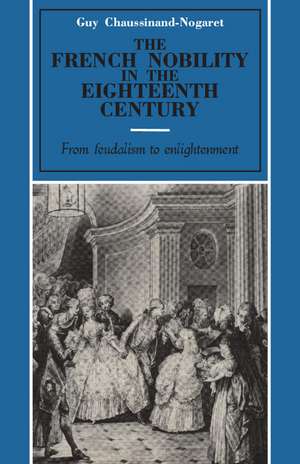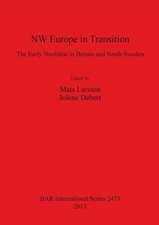The French Nobility in the Eighteenth Century: From Feudalism to Enlightenment
Autor Guy Chaussinand-Nogaret Traducere de William Doyleen Limba Engleză Paperback – 15 mai 1985
Preț: 375.39 lei
Nou
Puncte Express: 563
Preț estimativ în valută:
71.83€ • 74.100$ • 59.45£
71.83€ • 74.100$ • 59.45£
Carte tipărită la comandă
Livrare economică 05-19 aprilie
Preluare comenzi: 021 569.72.76
Specificații
ISBN-13: 9780521275903
ISBN-10: 0521275903
Pagini: 204
Dimensiuni: 138 x 215 x 14 mm
Greutate: 0.3 kg
Editura: Cambridge University Press
Colecția Cambridge University Press
Locul publicării:Cambridge, United Kingdom
ISBN-10: 0521275903
Pagini: 204
Dimensiuni: 138 x 215 x 14 mm
Greutate: 0.3 kg
Editura: Cambridge University Press
Colecția Cambridge University Press
Locul publicării:Cambridge, United Kingdom
Cuprins
Introduction: the gilded ghetto of royal nobility; 1. The Enlightenment and noble ideology; 2. The nobility between myth and history; 3. Plutocrats and paupers; 4. The fundamental divide: culture; 5. The nobility and capitalism; 6. Rites and strategies: the marriage market; 7. The nobility against the Old Regime; 8. A plan for society; Conclusion; Afterword to the English edition; Notes; Bibliography; Index.
Recenzii
'From its appearance in 1976, Chaussinand-Nogaret's book was immediately recognized as making a major contribution to the revaluation of eighteenth-century France and to the origins of the French Revolution. Its appearance in English is long overdue, but the author has been lucky in his translator. Professor Doyle brings to his work a thorough command of French, the ability to write clear and attractive English and a command of the subject that allows him not merely to appreciate the nuances of the text but to present its ideas in terms that an English-speaking audience can immediately recognize and assimilate. The result, in the form of a short and pithy book, at a reasonable price, deserves an enthusiastic welcome from everyone teaching the subject to sixthformers or undergraduates unable to cope with the French text.' Norman Hampson, History


























